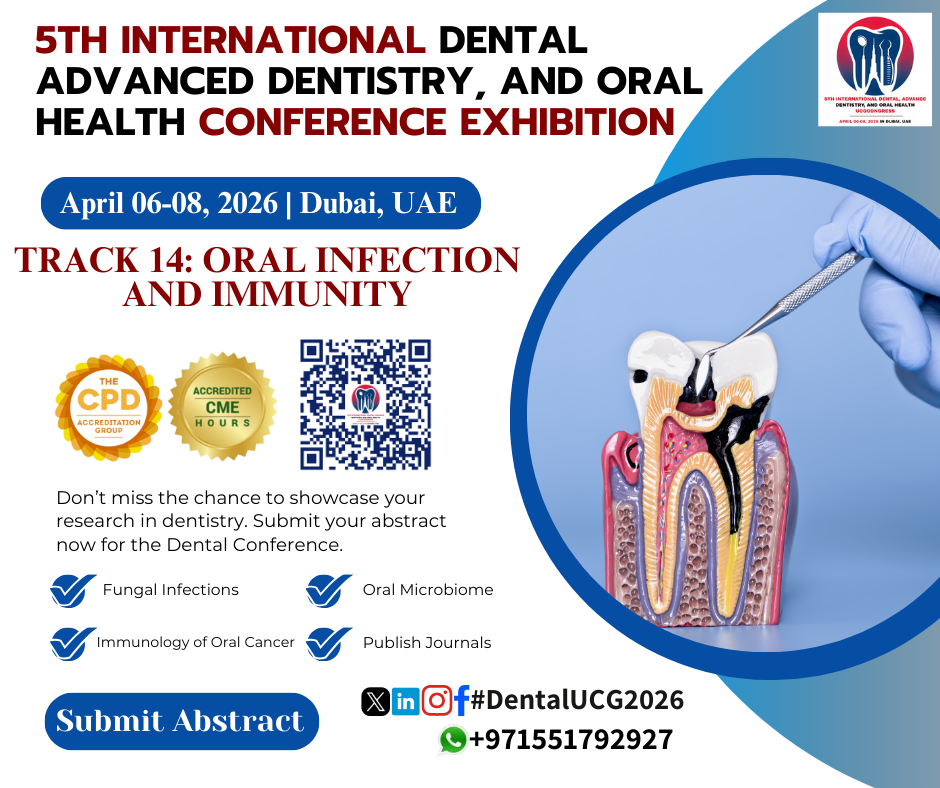Sub-tracks:
Microbial Pathogens, Host Immune Response, Oral Mucosal Diseases, Periodontal Infections, Oral Candidiasis, Systemic Impact of Oral Infections, Diagnostic Techniques, Immunological Markers, Antibiotic Resistance, Preventive Strategies, Treatment Protocols, Vaccination and Immunization, Clinical Management of Infections, Impact of Oral Hygiene, Research and Innovations
What is Oral Infection and Immunity?
Oral infection and immunity involve the body’s response to pathogens in the mouth and its ability to manage infections. The oral cavity is constantly exposed to bacteria, viruses, and fungi, which can lead to infections such as dental caries, periodontal disease, and oral candidiasis. The immune system plays a critical role in defending against these infections. Saliva acts as a natural defense, containing antimicrobial proteins and enzymes that help neutralize harmful microorganisms. The mucosal immune system, including lymphoid tissues like tonsils, also contributes to oral immunity by identifying and responding to pathogens.
When oral infections occur, the immune system activates inflammatory responses to eliminate the infection, repair damaged tissues, and restore oral health. This process involves various immune cells, including neutrophils, macrophages, and T-cells, which work to control and eradicate the infection. Effective oral hygiene practices, such as brushing, flossing, and regular dental check-ups, help maintain oral health and support the immune system in preventing infections. Disruptions to the immune system or poor oral hygiene can lead to chronic infections, impacting overall health and quality of life. Understanding the interplay between oral infections and immunity is crucial for preventing and managing oral health issues effectively.
Immunological Markers, Antibiotic Resistance:
Immunological markers are substances used to assess immune system function and identify infections or inflammatory conditions. They include proteins, cytokines, and antibodies that indicate immune responses. Antibiotic resistance occurs when bacteria evolve to withstand the effects of antibiotics, making infections harder to treat. This resistance is often due to overuse or misuse of antibiotics, leading to the survival and proliferation of resistant strains. Monitoring immunological markers helps in diagnosing and managing infections, while understanding antibiotic resistance is crucial for developing effective treatment strategies and ensuring the continued efficacy of antibiotics in combating infections.
Periodontal Infections:
Periodontal infections affect the tissues surrounding and supporting the teeth, including the gums, periodontal ligament, and bone. These infections, commonly caused by bacteria, lead to conditions such as gingivitis and periodontitis. Gingivitis involves inflammation of the gums, causing redness and swelling, while periodontitis results in deeper tissue damage, bone loss, and potential tooth mobility. Symptoms may include bleeding gums, bad breath, and gum recession. Effective management involves professional cleanings, improved oral hygiene, and, in advanced cases, surgical interventions. Prompt treatment and ongoing care are essential to prevent progression and maintain oral health.





